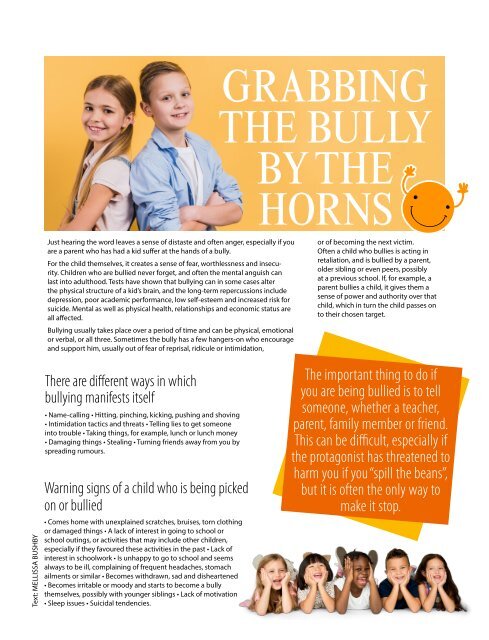Sep 2019 - Lowveld
Our super Heritage issue!
Our super Heritage issue!
- No tags were found...
Create successful ePaper yourself
Turn your PDF publications into a flip-book with our unique Google optimized e-Paper software.
Text: MELLISSA BUSHBY<br />
Just hearing the word leaves a sense of distaste and often anger, especially if you<br />
are a parent who has had a kid suffer at the hands of a bully.<br />
For the child themselves, it creates a sense of fear, worthlessness and insecurity.<br />
Children who are bullied never forget, and often the mental anguish can<br />
last into adulthood. Tests have shown that bullying can in some cases alter<br />
the physical structure of a kid’s brain, and the long-term repercussions include<br />
depression, poor academic performance, low self-esteem and increased risk for<br />
suicide. Mental as well as physical health, relationships and economic status are<br />
all affected.<br />
Bullying usually takes place over a period of time and can be physical, emotional<br />
or verbal, or all three. Sometimes the bully has a few hangers-on who encourage<br />
and support him, usually out of fear of reprisal, ridicule or intimidation,<br />
There are different ways in which<br />
bullying manifests itself<br />
• Name-calling • Hitting, pinching, kicking, pushing and shoving<br />
• Intimidation tactics and threats • Telling lies to get someone<br />
into trouble • Taking things, for example, lunch or lunch money<br />
• Damaging things • Stealing • Turning friends away from you by<br />
spreading rumours.<br />
Warning signs of a child who is being picked<br />
on or bullied<br />
• Comes home with unexplained scratches, bruises, torn clothing<br />
or damaged things • A lack of interest in going to school or<br />
school outings, or activities that may include other children,<br />
especially if they favoured these activities in the past • Lack of<br />
interest in schoolwork • Is unhappy to go to school and seems<br />
always to be ill, complaining of frequent headaches, stomach<br />
ailments or similar • Becomes withdrawn, sad and disheartened<br />
• Becomes irritable or moody and starts to become a bully<br />
themselves, possibly with younger siblings • Lack of motivation<br />
• Sleep issues • Suicidal tendencies.<br />
GRABBING<br />
THE BULLY<br />
BY THE<br />
HORNS<br />
or of becoming the next victim.<br />
Often a child who bullies is acting in<br />
retaliation, and is bullied by a parent,<br />
older sibling or even peers, possibly<br />
at a previous school. If, for example, a<br />
parent bullies a child, it gives them a<br />
sense of power and authority over that<br />
child, which in turn the child passes on<br />
to their chosen target.<br />
The important thing to do if<br />
you are being bullied is to tell<br />
someone, whether a teacher,<br />
parent, family member or friend.<br />
This can be difficult, especially if<br />
the protagonist has threatened to<br />
harm you if you “spill the beans”,<br />
but it is often the only way to<br />
make it stop.<br />
How you, as a parent, can help<br />
• Speak to the school and your child’s teacher, make sure they understand<br />
the situation and are prepared to deal with it<br />
• Assure your kid that it is not their fault and that you will investigate<br />
it immediately<br />
• Stay calm and also remember that your child may feel embarrassed<br />
as well as frightened<br />
• Sometimes it is a much older child or even adult who is doing<br />
the bullying<br />
• Find out exactly what happened, who, when and where, and how<br />
often, and keep a record of that as well as your interaction with the<br />
school (if applicable, sometimes a bully is at church, aftercare or may<br />
even be a friend’s older sibling)<br />
• Get your child to open up and talk about it, make sure he or she<br />
understands that bullies thrive on control, hurt and intimidation<br />
• Stress to your kid that it will be sorted out<br />
• Make sure your child understands that it is normal to feel frightened,<br />
angry or intimidated and that there is nothing to be ashamed of<br />
• As tempting as it is, try not to confront the bully’s parents, this often<br />
drives people into defence mode and does not achieve anything other<br />
than antagonism, especially when the child in question is being bullied<br />
at home<br />
• Retaliation, also tempting, is not the answer either, as it against the<br />
rules and can backfire, making it worse<br />
• Always encourage your child to be assertive, but not aggressive<br />
• Make it clear that bullying is never, ever acceptable, on any level.<br />
It is crucial that parents and teachers<br />
remain vigilant and deal with any<br />
issues firmly and immediately,<br />
before the situation becomes<br />
unmanageable or dangerous.<br />
Children should always be allowed<br />
to feel safe and confident at school.<br />
What schools should do<br />
• If you notice something out of the ordinary, address the<br />
matter immediately<br />
• Make sure parents are always informed; whether their child is being<br />
bullied or is the bully, it is important to speak to them and work<br />
together to resolve the issue before it escalates<br />
• Increase adult supervision during break times, at toilets and in<br />
the schoolyard<br />
• Make anti-bully laws part of the school’s code of conduct<br />
• Have an information box where kids can report things anonymously<br />
• Offer counselling to deal with anger issues and aggressive behaviours<br />
• Emphasise the importance of respect, privacy and empathy<br />
• Always make sure that there are a few teachers with an<br />
open-door policy<br />
• Make it clear as a school that you do not accept any form of bullying<br />
• Remember that it is not only children who bully other children, it could<br />
be a teacher or adult in this role.<br />
RM-UP432236N


















